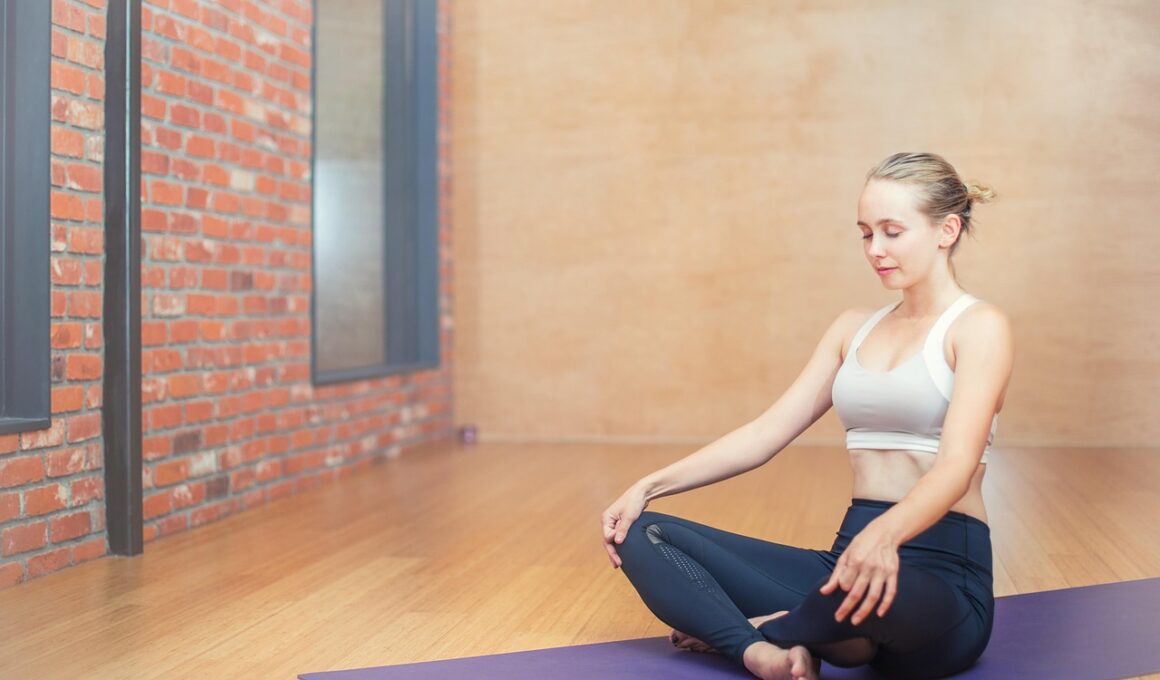Combining Yoga and Meditation for Better Sleep
Have you ever had those restless nights where sleep feels just out of reach? You’re not alone as sleep struggles affect many individuals across the globe. One effective solution that gains popularity is the combination of yoga and meditation. Together, they create a powerful practice that can enhance relaxation, reduce stress, and promote deeper, more restorative sleep. Yoga focuses on releasing tension in the body and calming the mind, while meditation emphasizes mental clarity and mindfulness. Integrating these two practices can help you establish a soothing bedtime routine. This article explores practical techniques and tips for maximizing your sleep quality using yoga and meditation naturally. Regular practice can build resilience against anxiety, leading you to a more peaceful night’s rest. The harmony achieved through yoga postures and meditation techniques can pave the way to improved sleep hygiene. By harmonizing these practices, you’re contributing to overall mental well-being while effectively preparing your body for rest. Learning to balance the mind and body can empower you to take control over your sleep patterns and enhance your sleeping satisfaction effectively.
Yoga offers a plethora of benefits that directly impact sleep quality. By practicing gentle yoga stretches and poses, individuals can release muscle tension, a common culprit in sleep disturbances. On the physical level, the body’s relaxation mechanisms are activated, promoting a state of calmness that is essential for falling asleep effortlessly. For those seeking better rest, consider establishing a dedicated nighttime yoga regime. Poses like Child’s Pose, Legs-Up-The-Wall, and Supta Baddha Konasana encourage a restful state. These stretches open up the body, reduce physical pressure, and enable deeper breaths, inducing relaxation that leads to sleep. Incorporating these poses into your nightly routine can significantly transform your sleep landscape. Additionally, holding these positions promotes mindfulness, thereby aligning both the body and mind. Another key aspect of yoga is conscious breathing, which slows down your heart rate and stabilizes your mental state. Simple breathing techniques can accompany your physical practice, enhancing its efficacy. Connecting breath with movement in a mindful manner allows you to release daily worries, thereby preparing you for a peaceful sleep. This holistic approach towards sleep through yoga can empower you towards making optimal choices on your journey to restful nights.
The Role of Meditation in Enhancing Sleep Quality
Meditation is often perceived as a mystical practice, but its role in improving sleep hygiene is concrete and backed by science. By focusing attention and eliminating distractions, meditation creates a mental space for relaxation and diminished anxiety. Regular meditation alters brainwave patterns, encouraging a state of calm conducive to sleep. Engaging in guided meditations specifically designed for sleep can amplify your results. These sessions often incorporate soothing audio, mindfulness techniques, and visualization that help you drift off effortlessly. Techniques such as Body Scan or Loving-Kindness meditation cultivate self-awareness and acceptance, reducing stress levels significantly. Practicing meditation before bedtime reaps various benefits; it allows you to unwind and transition experience from day to night smoothly. Cultivating this evening ritual can strongly signal to your mind and body that it’s time for rest. Through consistent meditation practice, your ability to manage thoughts improves, enabling you to detach from racing thoughts that might prevent sleep. Thus, introducing meditation to your nightly routine can significantly enhance your overall well-being. Pairing these moments of stillness with yoga poses can reinforce their efficacy, leading to a serene and restorative night’s sleep.
The synergy between yoga and meditation creates a powerful force for optimal sleep. While yoga preps the body physically with gentle movements, meditation dives deeper into the mental aspect of relaxation. When practiced together, these techniques harmonize and enhance one another. Setting the right environment is crucial for combined practice. Establish a tranquil space free from distractions, use dim lighting, and play ambient music to enhance your experience. Using calming scents like lavender or chamomile can also significantly enrich your session. Begin by performing a few gentle yoga poses to release physical tension, followed by meditation to foster mental clarity. This sequence helps your body to transition into a state conducive to sleep. You can try techniques such as visualization or focusing on your breath during meditation. When you integrate these practices consistently, you empower your body to foster better sleep quality. Allow time for this routine to take effect, and be aware that improvement may not be immediate. However, committing to this holistic approach strengthens the connection between mind and body, supporting a restful night’s sleep. Each session builds upon itself, leading toward sustainable sleep benefits for your overall health.
Creating a Yoga and Meditation Routine
To fully integrate yoga and meditation into your life for better sleep, developing a consistent routine is essential. Determine a schedule that works best for you, whether it’s early evening or just before bed. Aim for at least 20-30 minutes of practice each night. Start by preparing your physical space, ensuring that it is clean, quiet, and conducive to relaxation. Gather any necessary props, such as a yoga mat, cushions, or blankets that can support your practice, making it comfortable. You could also consider using apps or platforms that offer guided classes tailored towards relaxation, sleep, and mindfulness. Consider alternating between various yoga poses each night to keep your routine fresh and engaging. Monitor how your body responds to different practices, adjusting your routine accordingly. Establishing this consistency not only fosters deeper relaxation but also cultivates a sense of discipline within your overall self-care practice. Additionally, be patient with yourself as you navigate this journey towards improved sleep. Over time, you will discover which combinations work best for you, ultimately creating a routine that resonates with your personal rhythm and needs.
Research consistently shows a positive correlation between yoga, meditation, and improved sleep quality. Regular practice can lead to more restorative sleep cycles, as well as reducing sleep disturbances. Particularly, individuals suffering from insomnia or sleep-related issues have found relief through consistent engagement with yoga and meditation. Integrating these practices can not only enhance your sleep but also promote overall physical and emotional health, addressing issues like depression and anxiety. Many individuals report feeling more rested and alert upon awakening after applying these methods, leading to a better quality of life. It’s crucial, however, to engage with these practices mindfully, truly dedicating yourself to the experience. Being present during each yoga pose or meditation exercise enhances its benefits exponentially. Be attentive to your body’s responses; honoring its signals can guide you toward what works best for you. Additionally, it’s worth noting that lifestyle adjustments are equally significant. Complement your practices with healthy eating, reduced screen time before bed, and adequate hydration to maximize their benefits. You can harness the full potential of yoga and meditation, nurturing your body and mind alignment for a more serene path to sleep.
Conclusion and Looking Ahead
In conclusion, the dynamic duo of yoga and meditation presents a strategic approach to enhancing sleep quality. By combining physical movements with mental clarity exercises, you can address both body and mind to foster a more restorative sleep experience. Committing to a regular routine empowers you to integrate these practices effectively into your life. As you explore various techniques, keep track of how they impact your sleep patterns, adapting the regimen to suit your evolving needs. Scientific research supports the notion that these ancient practices contribute significantly to relaxation, stress reduction, and overall well-being. Consider joining classes that offer both yoga and meditation to empower your journey, and connect with like-minded individuals who share your goals. Maintain an open mind and embrace the gradual process of learning and adapting to your body’s needs. As you embark on this path towards improved sleep, be patient and listen to your body’s responses. Ultimately, with perseverance and dedication, the blending of yoga and meditation has the potential to transform your sleep and overall quality of life.
As you engage with this holistic approach to sleep, remember that the journey is genuinely personal and unique for everyone. Keeping a journal to track your experiences may provide insights into the progress and changes you notice. The integration of yoga and meditation into your nightly routine can indeed create a lasting impact on your sleep hygiene, gradually supporting you in finding peace and tranquility in your nightly rituals. Pay attention to different factors such as the time of day, types of poses best suited for your needs, and how various meditation techniques resonate with you. The more you engage with these practices, the more insights you will gain regarding your personal sleep journey. Tuning in to your body and being receptive to its needs can significantly enhance this experience, allowing you to evolve your methods as necessary. Stay committed to your wellness journey and take incremental steps towards the sleep quality you desire. Over time, you will likely find comfort and relaxation within this practice, leading to improved well-being. Trust your instincts, embrace the changes, and allow the synergy of yoga and meditation to guide you towards rejuvenating sleep.


